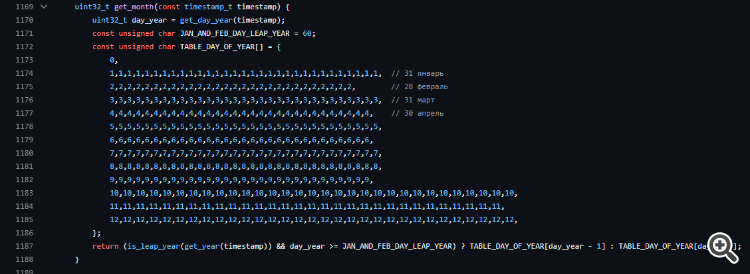Features of the mql5 language, subtleties and tricks - page 253
You are missing trading opportunities:
- Free trading apps
- Over 8,000 signals for copying
- Economic news for exploring financial markets
Registration
Log in
You agree to website policy and terms of use
If you do not have an account, please register
I once said that it is a good idea to start the year on 1 March instead of 1 January. Then the curve February becomes the last month.
Then you can apply the formula to find the month:
Check out this implementation.
Forum on trading, automated trading systems and testing trading strategies
Peculiarities of mql5 language, subtleties and techniques of work
fxsaber, 2024.04.16 18:31
Easy to understand the source code.
Check out this implementation.
Ha-ha, they didn't bother much there, they just threw in an array of 365 (or 366) elements.

maybe it's justified
Haha, they didn't bother much there, they just stuck a 365 (or 366) element array in there
maybe it's justified
If the speed is higher than the alternatives, it is 100% justified.
If the speed is higher than the alternatives, it is 100% justified.
I once said that it was a good idea to start the year on 1 March rather than 1 January.
Perhaps that's how it used to be. It's not for nothing that they say the Slavs had their new year in March.
See Latin/Sanskrit: 7 - septem/sapta, 8 - octo/ashta, 9 - novem/nava, 10 - decem/dasha. Accordingly, the 11th month was January and the 12th month was February.
Yeah, I checked, too.
the result:
function calculation time 1-3 ns. Light during this time passes 30 cm - 1 metre :)))I changed GetMonthTime4 name to a more descriptive one:
benchmark:
Results:
Wow! faster 100x times than native way.
Forget about StringToTime(). It is extremely slowwwww!I changed GetMonthTime4 name to a more descriptive one:
benchmark:
Results:
Wow! faster 100x times than native way.
Forget about StringToTime(). It is extremely slowwwww!Your code is well suited for compiler optimization.
Maximum Optimization:
No Optimization:
I'm just sharing the results of my runs
By the way, I tried to force your function to use a structure (to make the experiment more fair😄) and this did not affect performance - the result is the same (the difference is within the measurement error limits).
Forum on trading, automated trading systems and testing trading strategies
Libraries: Local Timezones and Local Session Hours
amrali, 2024.04.18 04:31
Update 18 April 2024 - version 1.88
Added the CreateDateTime internal method to construct datetime values from date components (year, month and day).
This is 100-120x times faster than assigning values to MqlDateTime struct then calling the StructToTime function.
I've changed the name GetMonthTime4 to be more descriptive:
Alternative.